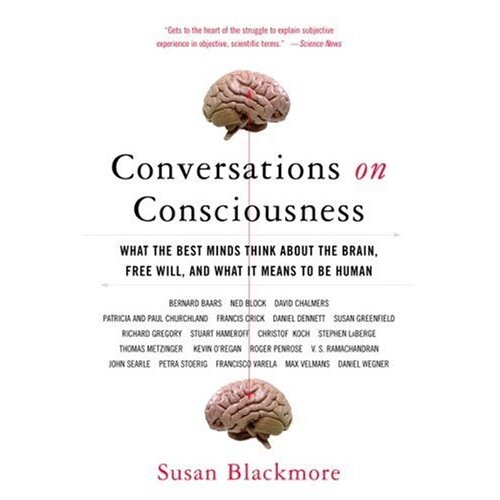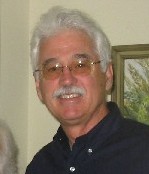Phil. 153
Philosophy of Mind
Philosophy 153
Spring Semester 2008
Prof. Dowden

Textbooks: Mind: A Brief Introduction by
John Searle, 2004. [Here's the cover of the paperback, but it's OK to
use the hard cover edition.]
and also
Conversation on Consciousness: What the Best Minds Think about the
Brain, Free Will, and What it Means to be Human," by Susan
Blackmore, Oxford University Paperback, 2007. The interviews are
in alphabetical order.
Catalog
description: Rival theories of the nature of the mind and mental activity, including dualism,
materialism, functionalism. Difficulties in achieving a theoretical
understanding of familiar psychological concepts such as belief,
sensation, emotion, intention. Prerequisite: 3 units in philosophy or instructor permission. 3 units.


Many of our readings are on the Internet.
A few leaflets and articles will be handed out during the
semester. Nearly all the material you will read in our course was
written in the period from 1950 to 2007. For non-required background
reading, I recommend the thin paperback Introducing Consciousness
by David Papineau and Howard Selina. It covers all the topics in this
course, but in a brief and informal way; each page of their book is
one-third text and two-thirds graphics.
Grades:
Your grade will be determined by class participation (5%), three homework sets (16% each), an
eight-page essay (23%) and a final exam (24%). Click
here for a schedule of when you will be
doing these. These dates are intended to be firm even if some
changes are made later to what topic we cover in what week. Your attendance
in class is not a requirement in our course; but the class
participation points are for occasionally taking part in class
discussions and activities. There will be no true-false or
multiple choice questions on assignments this semester.
Professor: My office is in
Mendocino Hall, room 3022. My weekly office hours are TTh 10:30 to 12:00. Feel free to stop by at any of those times
(or to call). If
those hours are inconvenient for you, then I can arrange an appointment
for an alternative time. You can send me e-mail at
dowden@csus.edu; or call my office at 278-7384; or
call the Philosophy
Department Office at 278-6424.
The fastest way to contact me is by email. My personal web page is at
http://www.csus.edu/indiv/d/dowdenb/index.htm

Dowden
Student outcome goals: The hope is that by the end of the semester you will have achieved the following goals:
Be able to identify the important contemporary issues discussed in the field.
Be able to distinguish the major philosophical theories of mind, such as the connectionist model from the symbolic model from the dualist model of the mind.
Be able to create an essay expressing and defending your own position on significant issues in the philosophy of mind.
Know some of the difficulties in achieving a theoretical understanding of familiar psychological concepts such as belief, sensation, emotion, and intention. For example, it is difficult for psychologists to explain why we experience red as red, pain as painful, or ourselves as selves.
Be able to read a journal article in the field of the philosophy of mind and grasp the author's thesis as well as know what the author's critics are likely to say.
Add-Drop: To add the course, try to do so by telephone using Casper. If
the course is full, then see me about signing up on the waiting list.
When there is room, students on the waiting list will be added in this
order: seniors graduating this semester, then all others by random
selection. To drop the course during the first two weeks, use
the Casper telephone system. No paperwork is required. After the first
two weeks, it is harder to drop, and a departmental form is required,
the "Petition to Add/Drop After Deadline." As with any university
course, make sure you are dropped officially (by Casper or by the
instructor or department secretary); don't simply walk away into the
ozone or else you will get a "U" grade for the course, which is counted
as an "F" in computing your GPA (grade point average).

Advice on exams: Robert Benchley
arrived for his
final exam in international law at Harvard University to find that the test
consisted of this one instruction: Discuss the arbitration of the
international fisheries problem in respect to hatcheries protocol and
dragnet and procedure as it affects (a) the point of view of the United
States and (b) the point of view of Great Britain. Benchley was
desperate, but he was also honest, and he wrote: I know nothing about
the point of view of Great Britain in the arbitration of the
international fisheries problem, and nothing about the point of view of
the United States. I shall therefore discuss the question from the
point of view of the fish.
Late assignments, and make-up assignments: I
realize that during your college career you occasionally may be unable
to complete an assignment on time. If this happens in our course,
contact me as soon as you are able. If you provide me with a good
reason for missing an assignment (illness, accident, etc.), then I'll use your grade on the final
exam as your missing grade. For homework assignments, there is a grade
penalty of one-third of a letter grade per 24-hour period beginning at
the class time the assignment is due. Examples.
If you turn in the assignment a few hours after it is due, then your A becomes an A-.
Instead, if you turn in the same assignment 39 hours late, then your A
becomes a B+. Weekends count. You may turn in your late work
by email. No late work will be accepted
after the answer pages have been handed out even if you are not in
class when it is handed out (often this will be at the
next class meeting) nor after the answers are discussed in class. There
will be no make-up tests nor make-up homework.
Disabilities: If you have a documented disability and
require accommodation or assistance with assignments, tests,
attendance, note taking, etc., please see me early in the semester so
that appropriate arrangements can be made to ensure your full
participation in class. Also, you are encouraged to contact the
Services for Students with Disabilities (Lassen Hall) for additional
information regarding services that might be available to you.
Weekly topics and reading assignments: Click here.

John Searle
Contact me if you would like more information about the course.
PROF.
DOWDEN /
PHILOSOPHY
DEPT.
COLLEGE
OF ARTS AND LETTERS
/ CSUS
The web address of this file is
http://www.csus.edu/indiv/d/dowdenb/153/s08/syl-s08.htm
updated: Jan. 1, 2008